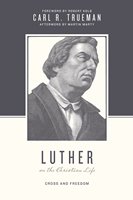Welcome again to Books At a Glance as we continue our discussions about the Protestant Reformation of the sixteenth century. I’m Fred Zaspel, and today we are talking to Dr. Carl Trueman. Carl is professor of church history at Westminster Theological Seminary here in Philadelphia, and he is a long-time friend of ours here at Books At a Glance. He has a specialized interest in all things Reformation and Martin Luther in particular, and we’re eager to hear from him over the next few episodes.
Carl, welcome, and thanks for talking to us.
Carl Trueman:
Great to be here, Fred.
Fred Zaspel:
First, give us a little background to Luther – his early life and how he came to be a monk.
Trueman:
Yeah. He was born in 1483, the son of what we would call, today I guess, lower-middle class parents. His father had been a miner and had risen to be a manager of mines in what would be modern day Germany. His father had destined him to be a lawyer; he had ambitions for his son to rise above the level that he himself had risen to, and so had him sent to the University of Erfurt. Luther became a monk as a result of, one week he was returning to university from home and was caught in a terrible thunderstorm and was narrowly missed by a thunderbolt, and is supposed to have thrown himself to the ground and cried out, “Saint Anne save me and I will become a monk.” Saint Anne, being the patron saint of miners and of people caught in thunderstorms, and so a convenient saint to call out to at that point. Probably Luther had already been thinking about spiritual vocation prior to that. We can’t know that for sure, but certainly it seems a very sudden and dramatic switch. So that was 1505, he became a monk as a result of this traumatic experience in a thunderstorm.
Zaspel:
How was justification by faith such a monumental discovery in Luther’s own experience?
Trueman:
Well Luther was a very intense man, very introspective at times, and somebody who was also very preoccupied with a question of how he could find a gracious God. How could he, a sinner, stand righteous before a God who was holy; and initially, his late medieval teachers had taught him that the way to do that was, to simplify it, was to “do his best,” to make the best effort he could, and if he did that, God would be gracious to him and He would grant him grace.
But the more Luther tried to do his best, the more he realized that he was falling very fall short of what he could actually achieve.
Then in 1515-1516, he was lecturing through Paul’s letter to the Romans, and he becomes convinced by Paul’s teaching that sin is not, as he’d be taught, merely a tendency or a weakness towards doing wrong things, but was actually a status of death. This precipitated further despair for Luther because a dead man can make no effort at all. So Luther became convinced that “doing one’s best” was really despairing of one’s self and throwing one’s self upon God’s mercy. Over the next few years he came to understand that God’s mercy was manifested, established, demonstrated in the Lord Jesus Christ. He came to understand that he could stand before a holy God as a righteous person if he threw himself upon God’s mercy and grasped Christ by faith and was clothed with Christ’s righteousness. This was a monumental personal discovery for him because it brought peace to a soul, his soul, that had been tremendously troubled by this idea, or this knowledge, that he was unholy, and that God was a holy and righteous God and that no man can stand in his own strength before such a God.
Zaspel:
Maybe I should ask you to tell us about his encounter with Tetzel, too, and how this played into things.
Trueman:
Yeah. The Reformation is traditionally regarded as starting October 31, 1517, when Luther set forth a set of theses for debate, he nails them to the castle door in Wittenberg, to debate on the practice of indulgences. Again, to cut a long story short, an indulgence is a piece of paper which you could purchase from the church that, for this cash transaction, gave you or a loved one certain time off Purgatory, the intermediate state between Heaven and Hell, where Christians who died went to be cleaned up to make themselves fit for Heaven. Justification by faith, it’s not even clear that Luther has come to his conclusions on that point by the end of 1517, and I’m inclined to think that he had not quite done so. But it does connect to the story of how Luther discovers justification by grace through faith because certainly, by October 1517, Luther was convinced that a mere cash transaction was not sufficient to gain any credit with God. There needed to be a transformation of the heart. Minimally, one needed to repent and despair of oneself. So the very first of the 95 theses says that when our Lord said, “repent,” he meant the whole of life to be one of repentance.
Zaspel:
Can we pinpoint the time of Luther’s conversion?
Trueman:
No, and if you ask Luther, “were you converted,” he would say, “No, I wasn’t.” Luther would tell you he was baptized, and I’m sorry Fred, he was baptized as a little baby. (Both men laugh). I’m affraid you baptists have got a whole lot harder to appropriate him. (Fred, “We’ll deal with that,” laughing.) But as a serious point, I think that, if Luther looked at modern-day conversionism, I think he would say there may be something legitimate there, but he would say don’t disregard your baptism, and do realize that being a Christian is not a matter of a single-crisis experience that brings you from wrath to grace. He would say that being a Christian in some ways is a continual crisis experience, that every second of every day, the Christian is to be dying to self and rising to newness of life. So he might actually extend his conversion to the whole of his life.
Zaspel:
And yet he did make some statements about his discovery of justification of faith in terms of his own experience and feeling reborn.
Trueman:
Yeah. In 1545, when he’s looking back–he gets the chronology somewhat wrong–at the events of, say, 1516 through to 1521, he talks about a breakthrough of justification and about how it was like going through the gates of paradise. Certainly, there is a moment when he seems to find his existential release through discovering justification by grace through faith. He would not have said that was the moment when he became a Christian, but it was the moment when he came to a true and full grasp of what Christ had done.
Zaspel:
Well, I don’t know Carl; a rose by any other name, you know?
Trueman:
(Laughing) Ah, you Baptists, you have to reinvent everybody in your own image, brother. (Both men laughing.)
Zaspel:
(Still laughing). Alright, last here, summarize for us the major points at issue between the Roman Catholic and the Protestant doctrines of justification. You’ve already talked about it a little bit, but crystalize that for us.
Trueman:
In some ways it’s pretty simple. On one level, Protestants and Catholics have something in common on the issue of justification, in that both Protestants and Catholics who know their theology would say that we are justified by the righteousness of Christ. That’s very clear both in the Council of Trent and in, say, the Augsburg Confession of the Lutheran church. But the differences are crucial. The difference, of course, is Protestants believe we are justified by the imputed righteousness of Christ, righteousness credited to our account. Roman Catholics believe that that righteousness is actually imparted to us. So Protestants see justification as a change of status before God; Catholics would see justification as a transformation of our being before God.
Then, perhaps as crucially, maybe even more crucial than that, is the instrument of justification, the means by which we are justified. Protestants say that it’s by grasping the word of God by faith; you hear the word of God proclaimed, you grasp it by faith, you are clothed in the righteousness of Christ. Catholics would say it is through being received into the sacramental system of the church. So, for a catholic taking Mass is more important than hearing the word of God because eating and drinking the body and blood of Christ is what infuses grace into a being and transforms you. So there are profound theological and practical differences between Protestantism and Catholicism.
Then finally, I think there is an existential aspect as well, and we touched on this earlier. Perhaps, just to make it clear, Protestants believe that the normal Christian experience should be one of assurance of salvation, and that’s closely linked to our understanding of justification. Roman Catholicism would deny that, that the normal of experience of a Christian is not that one can have assurance of salvation; and again, their understanding of justification as a process, and their understanding of the sacramental nature of justification, would connect to that.
Zaspel:
Very good; major differences, indeed.
We’re talking to Dr. Carl Trueman, professor of church history at Westminster Theological Seminary about the Protestant Reformation. Dr. Trueman has written quite a bit on church history, and you’ll want to check out some of his titles here on this page. Join us next time as he takes up the subject, Martin Luther and the Path to Reform.
Grace Alone—Salvation as a Gift of God: What the Reformers Taught…and Why It Still Matters (The Five Solas Series)
wtsbooks
Paperback
Luther on the Christian Life: Cross and Freedom
wtsbooks
Paperback
Histories and Fallacies: Problems Faced in the Writing of History
wtsbooks
Paperback
The Creedal Imperative
wtsbooks
Paperback
Reformation: Yesterday, Today and Tomorrow
Amazon
Paperback
wtsbooks
Paperback
John Owen: Reformed Catholic, Renaissance Man (Great Theologians)
Amazon
Paperback
wtsbooks
Paperback
Minority Report: Unpopular Thoughts on Everything from Ancient Christianity to Zen Calvinism
wtsbooks
Paperback

